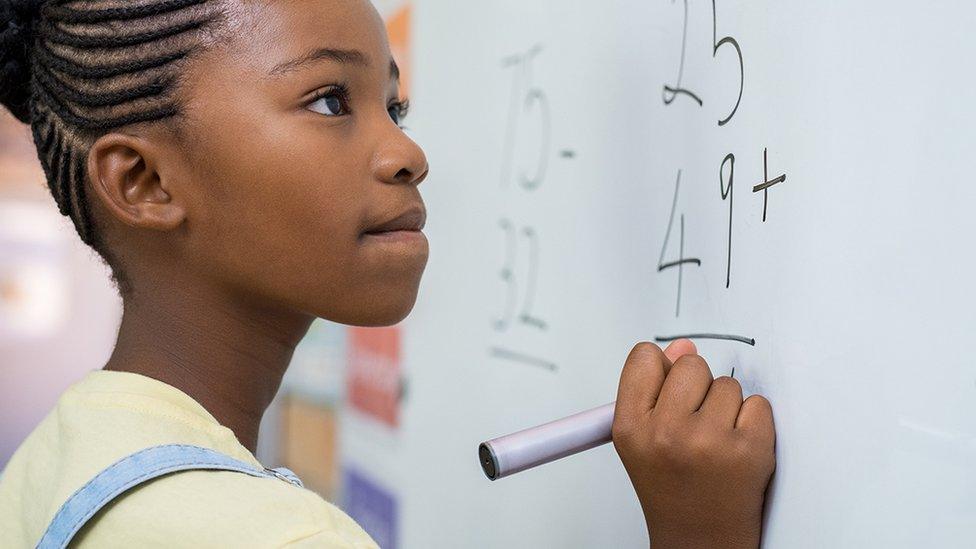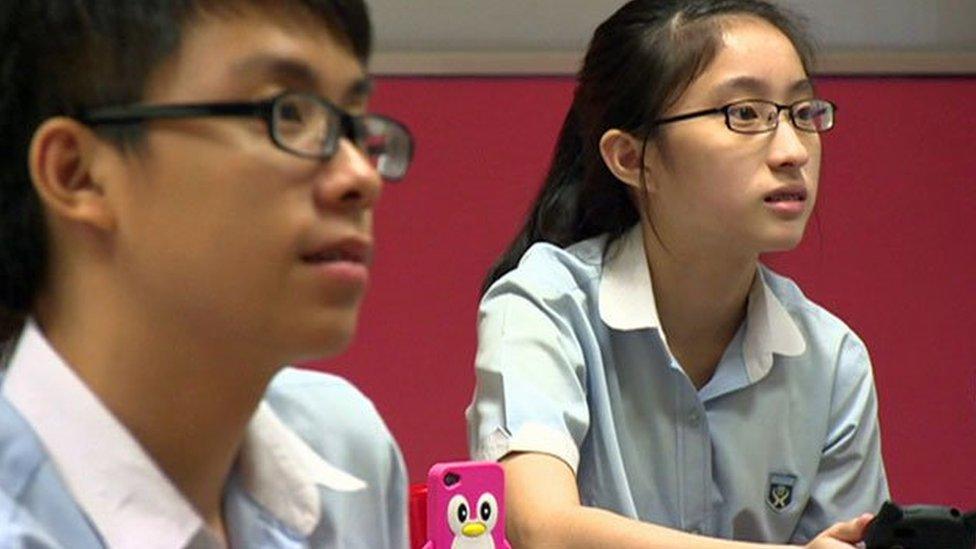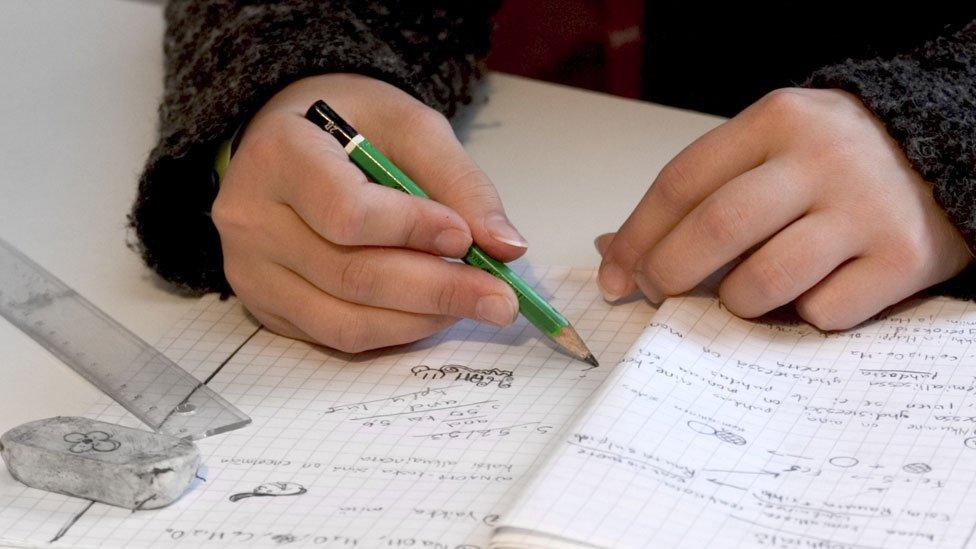England's children decline 'significantly' in science tests
- Published
- comments

The maths and science tests were taken by pupils in 64 countries
England's secondary pupils have "significantly declined" in international tests in science - but primary maths scores have improved.
In secondary school science, England slipped from 8th to 14th - its lowest ranking in 25 years of the "TIMSS" tests, taken in 64 countries.
Northern Ireland was ahead of England at primary maths in sixth place.
Top places in maths and science have been won again by Singapore and East Asian countries including South Korea.
Classroom behaviour
The overall results show a strong link between safe, well-behaved classrooms and high achievement, say the organisers of the international tests.
Head teachers' leader Geoff Barton said the dip in secondary science in England could reflect the difficulty that schools face in recruiting and retaining science teachers.
The Trends in International Mathematics and Science Study (TIMSS) are tests taken every four years, with 580,000 pupils, aged nine to 10 and 13 to 14, taking the latest round in 2019 - before the Covid pandemic.

Secondary science: Year 9
Singapore 608
Taiwan 574
Japan 570
South Korea 561
Russia 543
Finland 543
Lithuania 534
Hungary 530
Australia 528
Ireland 523
(14. England 517, 8th in 2015, 9th in 2011, 5th in 2007)
Scores are based from a midpoint of 500 points, so all of these top ranked countries are above average. Scotland and Wales did not take part and Northern Ireland only entered at primary level.

England's eighth place in primary maths is the highest ranking since the round of TIMSS tests in 2007.
But Northern Ireland stayed ahead at primary maths in seventh, although down one position from the previous tests in 2015.
A long-term overview of England's test results, from the UCL Institute of Education, says that performance in maths has improved over the 25 years in which the tests have been taken - and the latest primary results have "significantly improved".

Singapore has the best results at primary and secondary school in international tests
Until this latest fall, England's performance in secondary science had "remained broadly static" since 1995, says the analysis. But it has now "decreased significantly".
In those same years, countries such as Singapore and South Korea have made "amazing" progress, says Dirk Hastedt, executive director of the International Association for the Evaluation of Educational Achievement, which runs the tests with Boston College in the US.
"They have been improving, improving, improving," says Dr Hastedt about the East Asian countries that once again have dominated international education test results.

Primary maths: Year 5
Singapore 625
Hong Kong 602
South Korea 600
Taiwan 599
Japan 593
Russia 567
Northern Ireland 566 (6th in 2015, 6th in 2011)
England 556 (10th in 2015, 9th in 2011, 7th in 2007)
Ireland 548
Latvia 546

'Cultural' support for schools
There are strong "cultural" factors driving the educational success of these East Asian countries, he says.
Parents put a high value on their children performing well in school - and teachers are shown great respect, says Dr Hastedt.
There is also a "negative side", he says, in terms of parents putting too much pressure on children to do well.

Secondary maths: Year 9
Singapore 616
Taiwan 612
South Korea 607
Japan 594
Hong Kong 578
Russia 543
Ireland 524
Lithuania 520
Israel 519
Australia 517
(13. England 515; 11th in 2015, 10th in 2011, 7th in 2007)

Across all countries, the analysis of results found a strong link between good behaviour and high achievement.
Better results went alongside "fewer school discipline problems and safer and more orderly school environments".
Pupils who faced bullying did much less well - and the study found about 6%-8% of pupils faced bullying every week.
Out of top 10 for science
The tests in England were taken by almost 10,000 pupils in 368 schools, in Years 5 and 9 - with results above average for maths and science, but behind the leading group of Asian countries.

Primary science: Year 5
Singapore 595
South Korea 588
Russia 567
Japan 562
Taiwan 542
Finland 555
Latvia 542
Norway 539
United States 539
Lithuania 538
(12. England 537; 15th in 2015, 15th in 2011)
(26. Northern Ireland 518; 27th in 2015, 21st in 2011)

Tina Isaacs, part of the academic team analysing England's results, said the rise in primary maths was a "success" to be welcomed.
But Dr Isaacs said the drop in science was "disappointing" - and researchers would have to examine what had happened.
This would include whether it was linked to a decision from a decade before to end compulsory SATs tests in science.
Now in 14th place, England has previously been in the top 10 for secondary-level science, reaching the top five in 2007.

Primary maths have improved in England, but scores are still below Northern Ireland
These tests were taken before Covid - and Dr Isaacs warned the gap between richer and poorer pupils, found in the results, was likely to have widened in the pandemic.
An analysis by the National Foundation for Educational Research highlighted a lack of training in technology for primary school teachers in England, compared with other high-performing countries.
School Standards Minister Nick Gibb said the "strong performance" in maths was a "testament to the hard work of teachers and a reflection of the reforms we have put in place".
"We know there is more to, including continuing to improve the quality of science teaching."